高中英语状语从句的省略课件
- 格式:ppt
- 大小:636.50 KB
- 文档页数:42
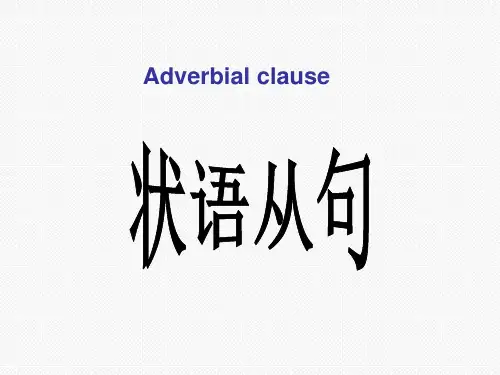
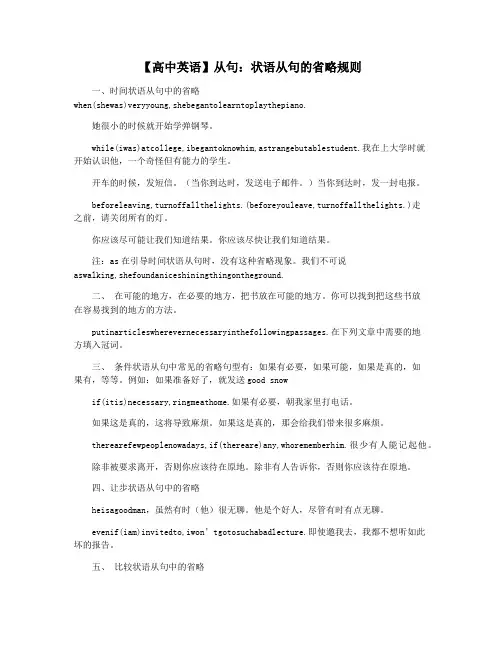
【高中英语】从句:状语从句的省略规则一、时间状语从句中的省略when(shewas)veryyoung,shebegantolearntoplaythepiano.她很小的时候就开始学弹钢琴。
while(iwas)atcollege,ibegantoknowhim,astrangebutablestudent.我在上大学时就开始认识他,一个奇怪但有能力的学生。
开车的时候,发短信。
(当你到达时,发送电子邮件。
)当你到达时,发一封电报。
beforeleaving,turnoffallthelights.(beforeyouleave,turnoffallthelights.)走之前,请关闭所有的灯。
你应该尽可能让我们知道结果。
你应该尽快让我们知道结果。
注:as在引导时间状语从句时,没有这种省略现象。
我们不可说aswalking,shefoundaniceshiningthingontheground.二、在可能的地方,在必要的地方,把书放在可能的地方。
你可以找到把这些书放在容易找到的地方的方法。
putinarticleswherevernecessaryinthefollowingpassages.在下列文章中需要的地方填入冠词。
三、条件状语从句中常见的省略句型有:如果有必要,如果可能,如果是真的,如果有,等等。
例如:如果准备好了,就发送good snowif(itis)necessary,ringmeathome.如果有必要,朝我家里打电话。
如果这是真的,这将导致麻烦。
如果这是真的,那会给我们带来很多麻烦。
therearefewpeoplenowadays,if(thereare)any,whorememberhim.很少有人能记起他。
除非被要求离开,否则你应该待在原地。
除非有人告诉你,否则你应该待在原地。
四、让步状语从句中的省略heisagoodman,虽然有时(他)很无聊。
他是个好人,尽管有时有点无聊。
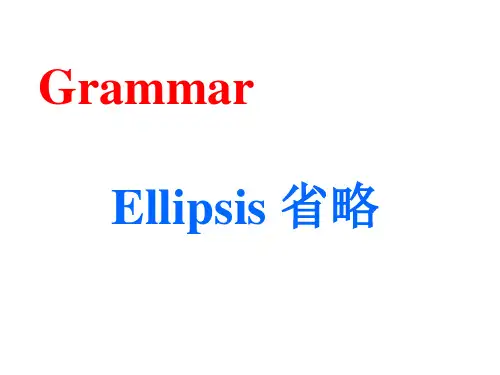
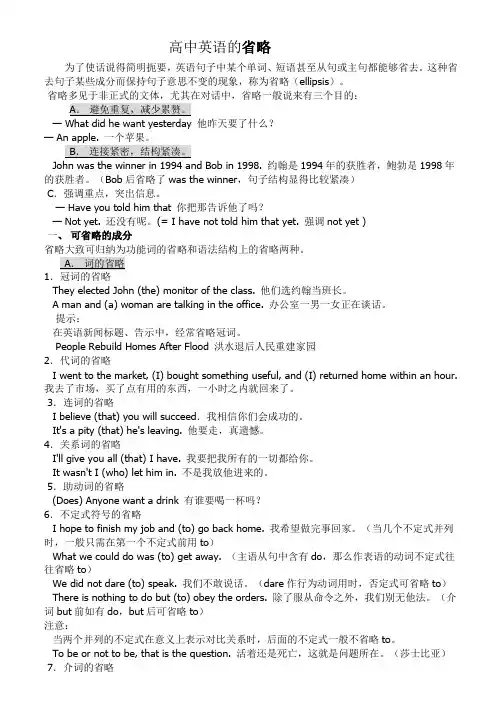
高中英语的省略为了使话说得简明扼要,英语句子中某个单词、短语甚至从句或主句都能够省去。
这种省去句子某些成分而保持句子意思不变的现象,称为省略(ellipsis)。
省略多见于非正式的文体,尤其在对话中,省略一般说来有三个目的:A.避免重复,减少累赘。
— What did he want yesterday 他昨天要了什么?— An apple. 一个苹果。
B.连接紧密,结构紧凑。
John was the winner in 1994 and Bob in 1998. 约翰是1994年的获胜者,鲍勃是1998年的获胜者。
(Bob后省略了was the winner,句子结构显得比较紧凑)C.强调重点,突出信息。
— Have you told him that 你把那告诉他了吗?— Not yet. 还没有呢。
(= I have not told him that yet. 强调not yet )一、可省略的成分省略大致可归纳为功能词的省略和语法结构上的省略两种。
A.词的省略1.冠词的省略They elected John (the) monitor of the class. 他们选约翰当班长。
A man and (a) woman are talking in the office. 办公室一男一女正在谈话。
提示:在英语新闻标题、告示中,经常省略冠词。
People Rebuild Homes After Flood 洪水退后人民重建家园2.代词的省略I went to the market, (I) bought something useful, and (I) returned home within an hour. 我去了市场,买了点有用的东西,一小时之内就回来了。
3.连词的省略I believe (that) you will succeed.我相信你们会成功的。
It's a pity (that) he's leaving. 他要走,真遗憾。

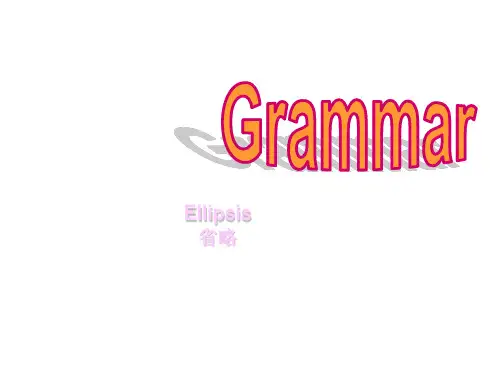
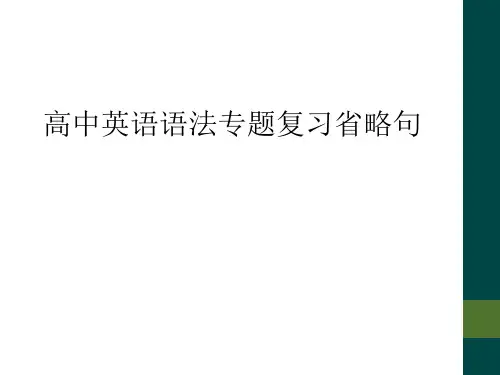

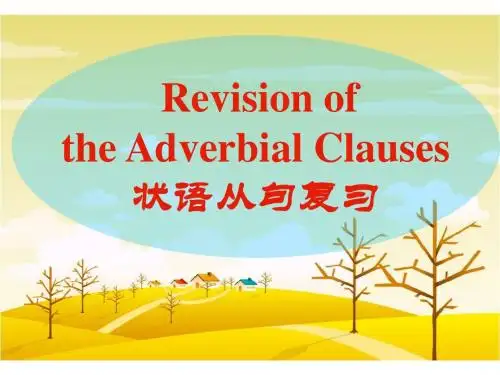

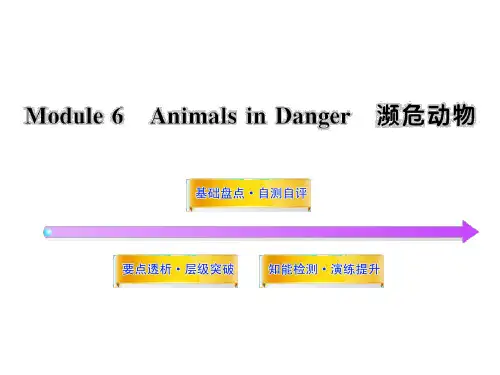
高中英语语法之省略英语中省略现象较为普遍,对省略的考查已成为高考中的热点。
句子成分的省略,可分为以下几种情况:为了使话说得简明扼要,英语句子中某个单词、短语甚至从句或主句都能够省去。
Ⅰ、状语从句中的省略用法一、如果从句的主语和主句的主语一致,且从句的谓语含有be动词的某种形式(am/is/are/was/were),可同时省略从句的主语和be动词的某种形式。
1、when,while引导的时间状语从句e.g. Do be careful when (you are) crossing the street.When/While (I was) on my way to work, I met her.2、if,unless,once引导的条件状语从句e.g. If (it is) properly treated, waste will do no harm to the environment.I’ll not go to the party unless (I am) invited.Once (you are) caught stealing in a supermarket, you will be punished.3、though,although,whether,no matter whether/what/how/who等引导的让步状语从句e.g. He was happy, though/although (he was) poor.Whether (she is) sick or well, she is always cheerful.No matter how/However hard the task (is), we must fulfill it in time.(注:从句的主语和主句的主语不一致时,只省略从句中的be动词形式)4、as if,as though引导的方式状语从句e.g. He rubbed his eyes and yawned as if/though (he was) waking up after along sleep.He stood up as if/though (he wanted) to leave.(as if/though + to do表示一个将来的动作)二、than,as引导的比较状语从句中的省略用法:当不同的主语实行比较时,一般省略从句中的谓语;当从句中的主语与谓语(be动词除外)和主句中的主语与谓语相同时,通常省略从句中的主语和谓语,只保留比较部分。
结合New Concept English Lesson 691.After/On ____ for the job, the applicants will be required to take a language test.A.interviewedB.interviewingC.having interviewedD.being interviewed这题能否理解为after后省略了they are2.On/After being told that her mother was seriously ill, she hurried backto England这题能否理解为after后省略了she waswhen,while,after,before,since,although后,,如果是主动语态的话,可以直接跟动词ing,在意义上相当于一个主动语态从句。
被动语态还可以用于此结构中3.After having been instructed to drive out of town, I began to acquire confidence.1)介词(after, before, on)+动名词这个结构通常相当于一个时间状语从句。
2)如果两个动作中有一个在另一个开始之前已经完成,则可以用after+动名词的完成式表示第1个动作;如果只表示先后顺序,则可用after(或before)+动名词结构;on+动名词通常表示两个动作几乎同时发生:=>The man called the police afterbeing robbed.=>He killed a child before being arrested.4.When ( the museum is ) completed , the museum will be open to the public next year . when后根据句意用了过去分词,Unit 1-2 的-ing复习5.At the age of fourteen, he left his village School in Scotland and taught himself while (he was )working in a bank.6.Then others went to work with Murry, including his two daughters(= and included his two daughters)(状语,补充说明谓语部分)首先要弄清楚什么情况下可以省略,什么情况下不可以省略。
高中英语里状语从句的省略问题高中英语学习中,常遇到状语从句出现省略的情况,尤其是当从句主语与主句主语一致,且从句谓语包括有动词be时,状语从句可省略从句里的主语和部分谓语,具体的情况如下:1在when,whenever,while,until,as soon as等引导的时间状语从句中,可以省略与主句中主语相同的主语和系动词或助动词。
When (he was) a child he ran wild. 他小的时候很不守规矩。
They were scolded whenever (they were) late for school.每次上学迟到,他们都要挨骂。
While (he was) in prison,he wrote his first novel.他在狱中写出了第一部小说。
As soon as (I am) on board I always feel sick. 我一上船就感到恶心。
2.在“no matter+疑问词”引导的让步状语从句中,可以省略系动词be和重复的主语。
Anyone,no matter who (he is),may point out my shortcoming.不管是什么人,谁向我指出缺点都行。
Anyone who commits a crime must be punished no matter what his position (is).任何犯罪的人都必须受到惩罚,不管他地位多高。
3.在though,as though,as if引导的让步,方式状语从句中,可以省略系动词be和重复的主语。
Though (he is) tall, he is very weak in health. 他虽然长得高,但身体却很弱。
He opened his mouth as if (he was) to speak. 他张开口,好像要说话似的。
4. 在if,unless,once等引导的条件状语从句中。